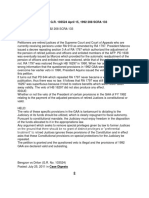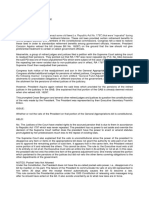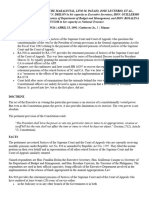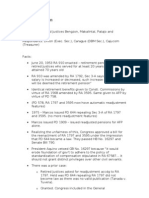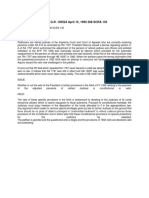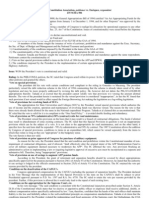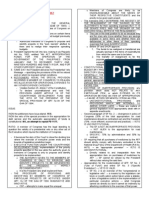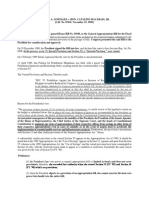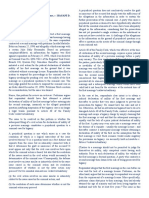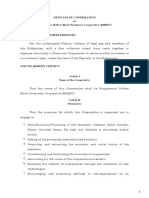Bengzon V Drilon 208 SCRA 133
Bengzon V Drilon 208 SCRA 133
Uploaded by
John Basil ManuelCopyright:
Available Formats
Bengzon V Drilon 208 SCRA 133
Bengzon V Drilon 208 SCRA 133
Uploaded by
John Basil ManuelOriginal Title
Copyright
Available Formats
Share this document
Did you find this document useful?
Is this content inappropriate?
Copyright:
Available Formats
Bengzon V Drilon 208 SCRA 133
Bengzon V Drilon 208 SCRA 133
Uploaded by
John Basil ManuelCopyright:
Available Formats
Bengzon v Drilon 208 SCRA 133
G. R. No. 103524, April 15, 1992
Facts:
Republic Act No. 1797, as amended, was enacted to provide the Justices of the Supreme
Court and of the Court of Appeals retirement pensions. Eventually, President Marcos
issued Presidential Decree 644 modifying the pensions to be fixed to the then prevailing
salary rates, instead of giving them automatic readjustment feature (i.e. pension to
increase or decrease as the salary at the time increases or decreases), like what they had
previously in RA 1797.
Having the impression that PD 644 repealed RA 1797, which resulted to the
discrimination against retired members of the Judiciary in terms of pension rates,
Congress approved House Bill No. 16297 (HB 16297) to restore the automatic
readjustment feature. However, President Aquino vetoed the bill for it would allegedly
disrupt the compensation standardization. It turned out however, that absent its
publication, PD 644 has never become a valid law, making HB 16297 superfluous for RA
1797 was still in effect. Additionally, the veto on HB 16297 produced no effect. Pursuant
to such, Congress included in the General Appropriations Bill (GAB) for Fiscal Year
1992 certain appropriations for the Judiciary intended for the payment of the adjusted
pension rates. President Aquino vetoed particular provisions in GAB.
This action assails the constitutionality of President Aquino’s veto of specific provisions
in GAB on the ground that: (1) the veto by the Executive violates the doctrine of
separation of powers; (2) the subject veto is not an item veto; (3) the veto impairs the
Fiscal Autonomy guaranteed (4) the veto deprives the retired Justices of their rights to the
pensions due them
ISSUES:
Whether or not the veto of the President on that portion of the General Appropriations bill
is constitutional.
HELD:
The Justices of the Court have vested rights to the accrued pension that is due to them in
accordance to Republic Act 1797 which was never repealed. The president has no power
to set aside and override the decision of the Supreme Court neither does the president
have the power to enact or amend statutes promulgated by her predecessors much less to
the repeal of existing laws.
The Supreme Court also explained that the veto is unconstitutional since the power of the
president to disapprove any item or items in the appropriations bill does not grant the
authority to veto part of an item and to approve the remaining portion of said item. It
appears that in the same item, the Presidents vetoed some portion of it and retained the
others. This cannot be done. The rule is: the Executive must veto a bill in its entirety or
not at all; the Executive must veto an entire line item in its entirety or not at all. In this
case, the president did not veto the entire line item of the general adjustment fund. She
merely vetoed the portion which pertained to the pensions of the justices but did not veto
the other items covering obligations to the other departments of the government.
You might also like
- IRR RA 6975, Dept of The Interior and Local Government Act of 1990Document37 pagesIRR RA 6975, Dept of The Interior and Local Government Act of 1990Kaye Brobo100% (8)
- Drdsnhs Consumer Cooperative Operations Manual: Responsibilities For Operations I. General MembershipDocument12 pagesDrdsnhs Consumer Cooperative Operations Manual: Responsibilities For Operations I. General MembershipBenditha Babac50% (2)
- Bengzon vs. DrilonDocument2 pagesBengzon vs. DrilonCarol Jacinto100% (7)
- Henry BurgstedenDocument7 pagesHenry BurgstedenHandin HandNo ratings yet
- Bengzon V DrilonDocument3 pagesBengzon V DrilonJc Isidro0% (1)
- Bengzon Vs DrilonDocument3 pagesBengzon Vs DrilonAnica EchagueNo ratings yet
- Bengzon v. Drilon G.R. 103524, April 15, 1992Document2 pagesBengzon v. Drilon G.R. 103524, April 15, 1992TrinNo ratings yet
- G.R. No. 103524. April 15, 1992 DigestDocument1 pageG.R. No. 103524. April 15, 1992 DigestMaritoni RoxasNo ratings yet
- Bengzon v. Drilon Case Digest - ERMITANODocument5 pagesBengzon v. Drilon Case Digest - ERMITANOAsh MangueraNo ratings yet
- Tañada v. Tuvera: ISSUE: Whether or Not The Veto of The President On That Portion of The GeneralDocument1 pageTañada v. Tuvera: ISSUE: Whether or Not The Veto of The President On That Portion of The GeneralTim PuertosNo ratings yet
- Bengzon V Drilon PDFDocument3 pagesBengzon V Drilon PDFMarl Dela ROsaNo ratings yet
- BENGZON v. DRILON DIGESTDocument3 pagesBENGZON v. DRILON DIGESTdg92826ncdNo ratings yet
- NOTES: Pocket Veto Not AllowedDocument3 pagesNOTES: Pocket Veto Not AllowedInnah Agito-RamosNo ratings yet
- Facts:: 156 SCRA 549 Constitutional Law 1 Newer PostDocument13 pagesFacts:: 156 SCRA 549 Constitutional Law 1 Newer PostCJ CasedaNo ratings yet
- Political Law - Veto Power - Inappropriate Provision in An Appropriation BillDocument21 pagesPolitical Law - Veto Power - Inappropriate Provision in An Appropriation BillCalagui Tejano Glenda JaygeeNo ratings yet
- Political Law - Veto Power - Inappropriate Provision in An Appropriation BillDocument7 pagesPolitical Law - Veto Power - Inappropriate Provision in An Appropriation BillCalagui Tejano Glenda JaygeeNo ratings yet
- 5 Bengzon Vs DrilonDocument2 pages5 Bengzon Vs DrilonChickoy RamirezNo ratings yet
- Bengzon Vs Drilon Case DigestDocument1 pageBengzon Vs Drilon Case DigestTin SagmonNo ratings yet
- Bengzon v. Drilon, 235 SCRA 506Document4 pagesBengzon v. Drilon, 235 SCRA 506adrlslawstudentNo ratings yet
- Bengzon vs. Drilon, 208 SCRA 133, April 15, 1992Document14 pagesBengzon vs. Drilon, 208 SCRA 133, April 15, 1992Edgar Joshua TimbangNo ratings yet
- Bengzon V Drilon DigestDocument3 pagesBengzon V Drilon DigestAlexandria FernandezNo ratings yet
- 6.6 (Par. 2) Bengzon v. Drilon, 208 SCRA 133Document1 page6.6 (Par. 2) Bengzon v. Drilon, 208 SCRA 133TricksterNo ratings yet
- 19 Bengzon V DrilonDocument1 page19 Bengzon V DrilonZepht BadillaNo ratings yet
- G.R. No. 103524, April 15, 1992: Bengzon vs. DrilonDocument1 pageG.R. No. 103524, April 15, 1992: Bengzon vs. DrilonCheryl Fenol100% (1)
- Bengzon VS DrilonDocument4 pagesBengzon VS DrilonFaith LacreteNo ratings yet
- 2 - Bengzon v. Drilon - SalvadorDocument3 pages2 - Bengzon v. Drilon - SalvadorJoannah GamboaNo ratings yet
- Cesar Bengzon Vs Franklin DrilonDocument2 pagesCesar Bengzon Vs Franklin DrilonTeresa CardinozaNo ratings yet
- Bengzon V DrilonDocument25 pagesBengzon V DrilonEunice NavarroNo ratings yet
- Bengzon vs. Drilon (208 SCRA 133)Document23 pagesBengzon vs. Drilon (208 SCRA 133)Mak FranciscoNo ratings yet
- Bengzon Vs DrilonDocument1 pageBengzon Vs DrilonRed ConvocarNo ratings yet
- Bengzon vs. DrilonDocument16 pagesBengzon vs. DrilonRaquel Doquenia100% (2)
- Case Digest: Bengzon vs. Drilon G.R. No. 103524 (15 April 1992) FactsDocument4 pagesCase Digest: Bengzon vs. Drilon G.R. No. 103524 (15 April 1992) FactsCatherine Joy CataminNo ratings yet
- BENGZON vs. DRILONDocument2 pagesBENGZON vs. DRILONjovelanvescanoNo ratings yet
- Bengzon v. DrilonDocument26 pagesBengzon v. Drilonliz kawiNo ratings yet
- Philconsa Vs JimenezDocument8 pagesPhilconsa Vs JimenezRex Del ValleNo ratings yet
- Bengzon V DrilonDocument1 pageBengzon V DrilonCarlota Nicolas VillaromanNo ratings yet
- Bengzon V DrilonDocument1 pageBengzon V DrilonCarlota Nicolas VillaromanNo ratings yet
- Consti Bengzon v. DrilonDocument1 pageConsti Bengzon v. DrilonNino Kim AyubanNo ratings yet
- Bengzon V Drilon DigestDocument3 pagesBengzon V Drilon DigestRocky GuzmanNo ratings yet
- BENGZON VS. DRILON G.R. 103524 April 15, 1992 208 SCRA 133Document2 pagesBENGZON VS. DRILON G.R. 103524 April 15, 1992 208 SCRA 133Khryz CallëjaNo ratings yet
- Petitioners vs. VS.: en BancDocument20 pagesPetitioners vs. VS.: en BancJM GenobañaNo ratings yet
- Bengzon vs. DrilonDocument1 pageBengzon vs. DrilonRiel BanggotNo ratings yet
- Bengzon Vs Drilon Case DigestDocument1 pageBengzon Vs Drilon Case DigestEsnani MaiNo ratings yet
- Bengzon Vs Drilon Case DigestDocument1 pageBengzon Vs Drilon Case DigestEsnani MaiNo ratings yet
- BENGZON VS. DRILON G.R. 103524 April 15, 1992 208 SCRA 133Document1 pageBENGZON VS. DRILON G.R. 103524 April 15, 1992 208 SCRA 133Abdulateef SahibuddinNo ratings yet
- Consti October 14 2017Document16 pagesConsti October 14 2017Westly JucoNo ratings yet
- Antonio Araneta Vs Judge Rafael Dinglasan: Political Law - First Emergency Powers CasesDocument26 pagesAntonio Araneta Vs Judge Rafael Dinglasan: Political Law - First Emergency Powers CasesGhost RiderNo ratings yet
- Philconsa Vs EnriquezDocument3 pagesPhilconsa Vs EnriquezMylaCambriNo ratings yet
- Statcon Notes 926Document9 pagesStatcon Notes 926JP LacubtanNo ratings yet
- Balag V Senate GDocument3 pagesBalag V Senate GVic RabayaNo ratings yet
- Article Vi, Sec. 27 Gonzales V. Macaraig FactsDocument22 pagesArticle Vi, Sec. 27 Gonzales V. Macaraig FactsGlean Myrrh ValdeNo ratings yet
- p16 - PCA V EnriquezDocument1 pagep16 - PCA V Enriquezcoffee addictNo ratings yet
- Philippine Constitution Association Vs Salvador EnriquezDocument1 pagePhilippine Constitution Association Vs Salvador Enriquezlckdscl100% (1)
- Param orDocument13 pagesParam orCarina Amor ClaveriaNo ratings yet
- Gonzales v. MacaraigDocument4 pagesGonzales v. Macaraiglouis jansenNo ratings yet
- Ang NARS vs. Executive Secretary DigestDocument2 pagesAng NARS vs. Executive Secretary DigestevgciikNo ratings yet
- Alegre Vs Collector of Customs Case Digest: FactsDocument8 pagesAlegre Vs Collector of Customs Case Digest: FactsNICK CUNANANNo ratings yet
- Philconsa Vs Hon. Salvador Enriquez Case DigestDocument2 pagesPhilconsa Vs Hon. Salvador Enriquez Case DigestMabsGeeNo ratings yet
- PHILCONSA vs. HON. SALVADOR ENRIQUEZDocument3 pagesPHILCONSA vs. HON. SALVADOR ENRIQUEZSwitzel SambriaNo ratings yet
- 1B Statutory Construction Module 1Document20 pages1B Statutory Construction Module 1Mary Ann AmbitaNo ratings yet
- Floresta V UbiadasDocument5 pagesFloresta V UbiadasJohn Basil ManuelNo ratings yet
- Alejano V CabuayDocument8 pagesAlejano V CabuayJohn Basil ManuelNo ratings yet
- Acme Shoe Rubber V CA 1996Document3 pagesAcme Shoe Rubber V CA 1996John Basil ManuelNo ratings yet
- Marcos V COMELEC 248 SCRA 300 (1995)Document2 pagesMarcos V COMELEC 248 SCRA 300 (1995)John Basil ManuelNo ratings yet
- G.R. No. 122150 March 17, 2003 George (Culhi) HAMBON, Petitioner, Court of Appeals and Valentino U. CARANTES, Respondents. Austria-Martinez, J.Document2 pagesG.R. No. 122150 March 17, 2003 George (Culhi) HAMBON, Petitioner, Court of Appeals and Valentino U. CARANTES, Respondents. Austria-Martinez, J.John Basil ManuelNo ratings yet
- G.R. No. 186597 June 17, 2015 People of The Philippines, Petitioner, Victoria R. Arambulo and Miguelarambulo, JR., RespondentsDocument3 pagesG.R. No. 186597 June 17, 2015 People of The Philippines, Petitioner, Victoria R. Arambulo and Miguelarambulo, JR., RespondentsJohn Basil ManuelNo ratings yet
- Leopoldo P. Dela Rosa For Petitioner. Emiterio C. Manibog For Private Respondent. City Fiscal of Manila For Public Respondent. RelovaDocument3 pagesLeopoldo P. Dela Rosa For Petitioner. Emiterio C. Manibog For Private Respondent. City Fiscal of Manila For Public Respondent. RelovaJohn Basil ManuelNo ratings yet
- Loney V PeopleDocument5 pagesLoney V PeopleJohn Basil ManuelNo ratings yet
- Marbella-Bobis V BobisDocument2 pagesMarbella-Bobis V BobisJohn Basil ManuelNo ratings yet
- People V de LeonDocument8 pagesPeople V de LeonJohn Basil ManuelNo ratings yet
- Domingo P. Gimalay vs. Court of Appeals, Et Al.Document19 pagesDomingo P. Gimalay vs. Court of Appeals, Et Al.John Basil ManuelNo ratings yet
- Rex J.M.A. Fernandez For Petitioner - Chanrobles Virtual Law Library Manguran B. Batuampar For RespondentsDocument3 pagesRex J.M.A. Fernandez For Petitioner - Chanrobles Virtual Law Library Manguran B. Batuampar For RespondentsJohn Basil ManuelNo ratings yet
- LBC Express-Vis, Inc. vs. Monica C. PalcoDocument20 pagesLBC Express-Vis, Inc. vs. Monica C. PalcoJohn Basil ManuelNo ratings yet
- Cabugao V PeopleDocument8 pagesCabugao V PeopleJohn Basil ManuelNo ratings yet
- Gamboa V CADocument3 pagesGamboa V CAJohn Basil ManuelNo ratings yet
- Labor Cases Feb 2020 (1-7)Document14 pagesLabor Cases Feb 2020 (1-7)John Basil ManuelNo ratings yet
- The Provincial Sheriff of Rizal, Petitioner, vs. The Honorable Court of APPEALS and SANDRA K. SHAOUY, RespondentsDocument5 pagesThe Provincial Sheriff of Rizal, Petitioner, vs. The Honorable Court of APPEALS and SANDRA K. SHAOUY, RespondentsJohn Basil ManuelNo ratings yet
- Elesio Mejares and Victor Cayno vs. Hyatt Taxi Services, Inc.Document19 pagesElesio Mejares and Victor Cayno vs. Hyatt Taxi Services, Inc.John Basil ManuelNo ratings yet
- Lufthansa Technik Philippines, Inc., Et Al. vs. Roberto CuizonDocument17 pagesLufthansa Technik Philippines, Inc., Et Al. vs. Roberto CuizonJohn Basil ManuelNo ratings yet
- Gaudioso Iso, Jr. and Joel Tolentino vs. Salcon Power CorporationDocument17 pagesGaudioso Iso, Jr. and Joel Tolentino vs. Salcon Power CorporationJohn Basil Manuel100% (1)
- AMADOR TAJANLANGIT, ET AL., Plaintiffs-Appellants, vs. SOUTHERN MOTORS, INC., ET AL., Defendants-AppelleesDocument3 pagesAMADOR TAJANLANGIT, ET AL., Plaintiffs-Appellants, vs. SOUTHERN MOTORS, INC., ET AL., Defendants-AppelleesJohn Basil ManuelNo ratings yet
- Arce Vs GenatoDocument4 pagesArce Vs GenatoJohn Basil ManuelNo ratings yet
- Aniano Oba?A, Petitioner, vs. The Court of Appeals and Aniceto SANDOVAL, RespondentsDocument4 pagesAniano Oba?A, Petitioner, vs. The Court of Appeals and Aniceto SANDOVAL, RespondentsJohn Basil ManuelNo ratings yet
- Ridad Luis Et Al Vs Filipinas Investment Et AlDocument4 pagesRidad Luis Et Al Vs Filipinas Investment Et AlJohn Basil ManuelNo ratings yet
- Canuto Martin Vs Maria Reyes and Pedro Revilla091 Phil 666Document3 pagesCanuto Martin Vs Maria Reyes and Pedro Revilla091 Phil 666John Basil ManuelNo ratings yet
- Askay Vs Cosalan 46 Phil 179Document2 pagesAskay Vs Cosalan 46 Phil 179John Basil ManuelNo ratings yet
- Chamber of Real Estate and Builders' Associations, Inc. v. The Hon. Executive SecretaryDocument14 pagesChamber of Real Estate and Builders' Associations, Inc. v. The Hon. Executive SecretaryJohn Basil ManuelNo ratings yet
- Peran LSM Dalam Pengungkapan Kasus Korupsi Jalan Lingkar Kota SalatigaDocument11 pagesPeran LSM Dalam Pengungkapan Kasus Korupsi Jalan Lingkar Kota SalatigaLuqmanNo ratings yet
- OSH ProgrammingDocument18 pagesOSH ProgrammingChristian MeanaNo ratings yet
- Gec 3 Module 4 Global Interstate SystemDocument13 pagesGec 3 Module 4 Global Interstate SystemFreiane Nicole Anghad100% (1)
- Regulations and Governance Lectures and Literature: TijmendkDocument37 pagesRegulations and Governance Lectures and Literature: TijmendkJohnNo ratings yet
- Disini vs. Sec. of JusticeDocument2 pagesDisini vs. Sec. of JusticePauline Dgm100% (1)
- Zero Hunger SpeakingDocument9 pagesZero Hunger SpeakingEnna NovyartyNo ratings yet
- Full Length Research Article Slums in India: A Focus On Metropolitan CitiesDocument7 pagesFull Length Research Article Slums in India: A Focus On Metropolitan CitiesQadir JavedNo ratings yet
- The European UnionDocument2 pagesThe European Unionعلی خانNo ratings yet
- Powers and ProceduresDocument1 pagePowers and ProceduresGEETHANA ARIKATLANo ratings yet
- Compal Confidential: D7W01 ODD/B Schematics DocumentDocument2 pagesCompal Confidential: D7W01 ODD/B Schematics DocumentLuis Alberto ArizaNo ratings yet
- Satish Pradhan Dnyanasadhana College: Department of BMS Sample MCQ Questions Subject: Indirect TaxDocument5 pagesSatish Pradhan Dnyanasadhana College: Department of BMS Sample MCQ Questions Subject: Indirect TaxSallu SaleemNo ratings yet
- Tutorial 1 (Answer) - Tax Evasion and AvoidanceDocument5 pagesTutorial 1 (Answer) - Tax Evasion and Avoidance--bolabolaNo ratings yet
- Chapter 3 CSR Theory and ModelsDocument22 pagesChapter 3 CSR Theory and ModelsAbdullah NomanNo ratings yet
- Env PolicyDocument3 pagesEnv PolicybomiNo ratings yet
- Articles of Cooperation PrimaryDocument16 pagesArticles of Cooperation PrimaryFay FayNo ratings yet
- EFTA - The European Free Trade AssociationDocument5 pagesEFTA - The European Free Trade Associationstefi4kaNo ratings yet
- Ucsp 12 NAME: - GRADE and SECTION: - F. 7. C. Health As Human Right According To World Health Organization (WHO)Document1 pageUcsp 12 NAME: - GRADE and SECTION: - F. 7. C. Health As Human Right According To World Health Organization (WHO)Celia BautistaNo ratings yet
- Universal Declaration of Human Rights - United NationsDocument12 pagesUniversal Declaration of Human Rights - United NationsSafdar HussainNo ratings yet
- Term Paper: University of LagosDocument8 pagesTerm Paper: University of LagosDennis OmobiNo ratings yet
- Module 5 SummaryDocument3 pagesModule 5 SummaryJoan Jambalos TuertoNo ratings yet
- Erm - 1Document9 pagesErm - 1Mansi GoelNo ratings yet
- Pal Vs EduDocument3 pagesPal Vs EdukenNo ratings yet
- Course Outline of Administrative Law - Girish RDocument10 pagesCourse Outline of Administrative Law - Girish RShubham PhophaliaNo ratings yet
- Accounting Standard Setting and Its Economic ConsequencesDocument18 pagesAccounting Standard Setting and Its Economic ConsequencesFabian QuincheNo ratings yet
- Facts of The Case:: PetitionerDocument3 pagesFacts of The Case:: PetitionerGEETHANA ARIKATLANo ratings yet
- FD0324Document72 pagesFD0324richard emersonNo ratings yet
- WSEAS TRANSACTIONS On ENVIRONMENT and DEVELOPMENTDocument7 pagesWSEAS TRANSACTIONS On ENVIRONMENT and DEVELOPMENTmariajosemeramNo ratings yet





